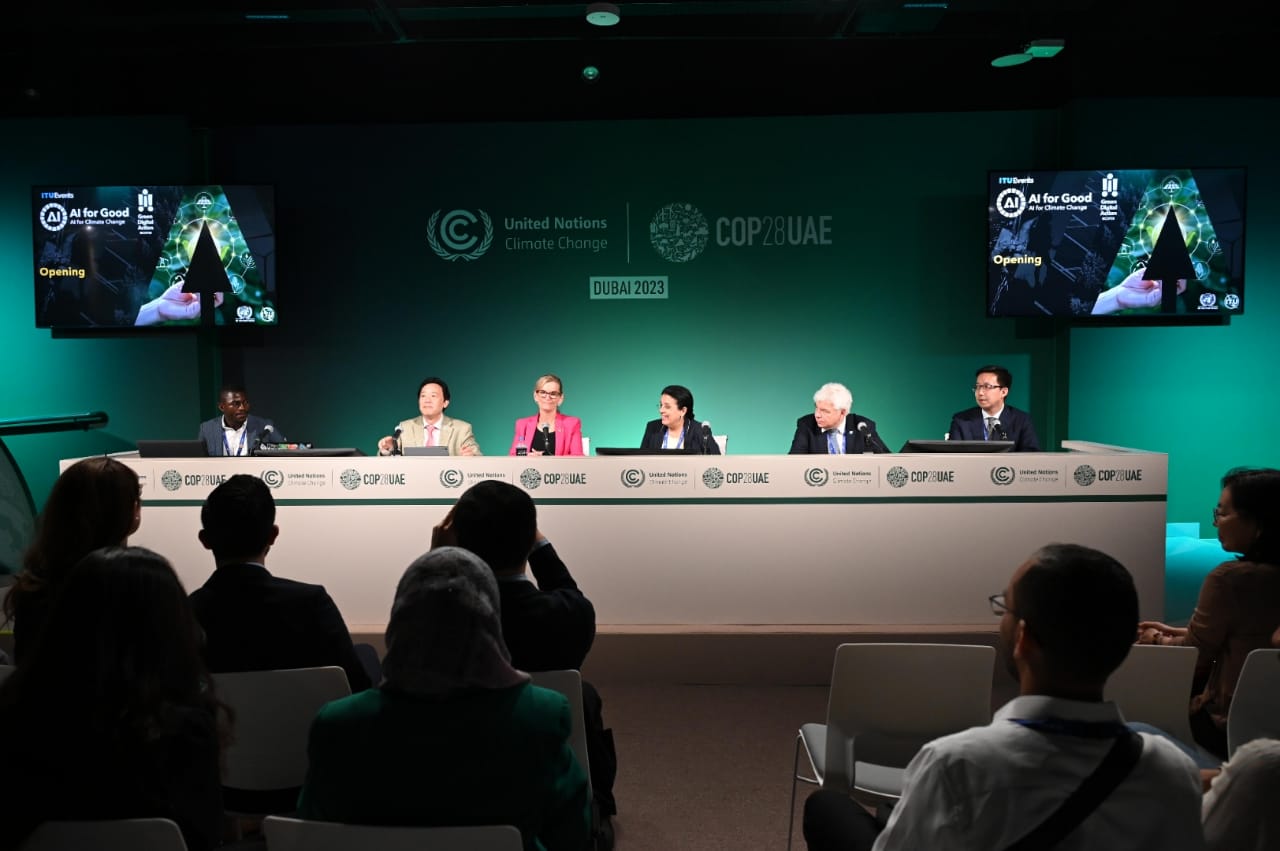COP28 must be a ‘game changer’ for agrifood systems, FAO Director-General urges
As agrifood systems transformation gains momentum at COP28, QU Dongyu said it’s time to walk the talk

The COP28 venue in Dubai, United Arab Emirates.
©UNFCCC/Kiara Worth
Dubai- Agrifood systems solutions deliver triple wins for climate, people and nature, the Director-General of the Food and Agriculture Organization of the United Nations QU Dongyu told a high-level event this Saturday at the UN Climate Conference COP28 in Dubai.
“We are at an important moment in COP history. We have agrifood systems at the top of COP. It is a turning point…use this COP28 to work together in relevant partnerships and make it a ‘game changer’”, he told participants urging nations to ‘’walk the talk’’.
Reiterating his message to world leaders at the World Climate Action Summit, Qu underscored that achieving the 2030 Agenda and the SDGs is only possible by transforming agrifood systems to be more efficient, more inclusive, more resilient and more sustainable.
He added that a transformation is urgently needed taking into account that eight billion people don’t have access to healthy diets, over 700 million people are currently living in hunger, and 80% of the global rural poor depend indirectly on agrifood systems for their livelihoods.
“I have come here with a clear message and positive message: agrifood systems solutions are climate solutions! They are also solutions for biodiversity, poverty, and health”, he said.
The Director-General also recognized the UAE’s efforts on their new leader’s agriculture food and climate action declaration, which has set forth ambitious intentions to integrate agriculture and food systems into the Paris Agreement. Qu urged the international community to swiftly turn these intentions into action by establishing partnerships and leveraging science, innovation and technology.
Agrifood systems momentum
The FAO-led event also had keynote speeches from Rabab Fatima Under Secretary-General and High Representative for the Least Developed Countries (LDCs), Landlocked Developing Countries (LLDCs) and Small Island Developing States (SIDS); and Alvaro Lario, President of the International Fund for Agricultural Development (IFAD).
Fatima underscored that the upcoming third United Nations Conference for landlocked developing countries and the fourth international conference for small island developing states, both scheduled for 2024, are crucial opportunities for creating meaningful change, forging new partnerships, and establishing commitments for more sustainable and resilient agricultural and food systems.
Lario called for inclusive, sustainable food systems that support small farms, reduce poverty, and prevent forced migration and conflicts over resources. He urged leaders to understand the true costs of existing food systems and attract diverse financial flows, including from the private sector, to instigate meaningful change for millions of small-scale farmers and rural communities.
Their speeches were followed by a panel conversation with the Minister of Economy and Finance of Uruguy, Azucena Maria Arbeleche; Minsiter of Water Resources and Irrigation of Egypt, Hani Sewilam; and the President of the East African Farmers Federation Elizabeth Nsimadala. The speakers cited many initiatives within their nations and regions to transform agrifood systems and support climate action.
 Director-General delivers keynote speech at at COP28 event: Crowdsourcing AI Solutions for Climate Change
Director-General delivers keynote speech at at COP28 event: Crowdsourcing AI Solutions for Climate Change
Artificial Inteligence to revolutionatize agrifood sectors
Earlier in the day, the FAO Director-General participated in an event led by the International Telecommunication Union (ITU) on crowdsourcing Artificial Intelligence (AI) for Climate Change.
Delivering the keynote address, Qu Dongyu emphasized the pivotal role of science and innovation in shaping the future, especially in the face of the climate crisis. He highlighted FAO's commitment to leveraging AI through its Science and Innovation Strategy, -aimed among other goals- at fortifying the organization's response to climate change.
“This is really close to my heart. Science and innovation are a crucial element for my vision to transform FAO and to build a dynamic and digital organization”, he told participants reunited at the UN Systems Pavilion.
The Director-General underscored the potential of AI to “revolutionize agrifood systems”, making them more resilient and sustainable. He emphasized the daily use of AI in FAO's services and advocated for its broader implementation to aid smallholder farmers grappling with the impacts of climate change.
Similarly, he spoke about the importance of big data. For predictive models, it has the potential to provide timely advice to farmers, prevent losses, and enhance overall efficiency, precision, and sustainability in agrifood sectors.
At the event, FAO received recognition for its Earth Map initiative in collaboration with Google to process and analyze satellite imagery and global datasets related to climate, vegetation, and biodiversity.
As part of ITU’s AI for Good Initiative, FAO showcased its partnership with Bloom Africa, a start-up set to enhance the accessibility and user-friendliness of Earth Map. Together they aim to elevate solutions for more accessible, effective, and safe digital innovations in the fight against climate change.
Qu concluded by expressing the Digital FAO's enthusiasm for co-creating the agriculture of the future with partners, envisioning better production, better nutrition, a better environment, and and a better life for all, leaving no one behind.
Contact
Laura Quinones FAO News and Media [email protected]
FAO News and Media (+39) 06 570 53625 [email protected]
